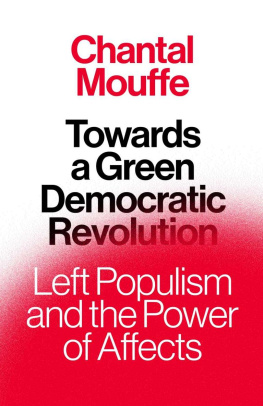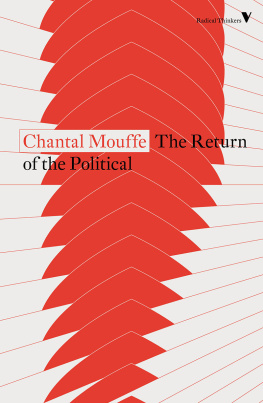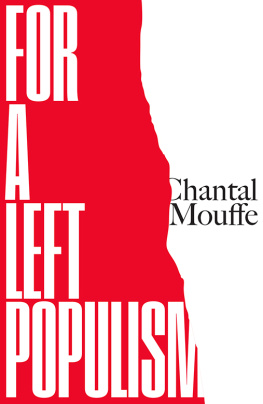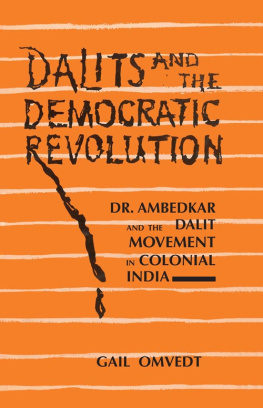Chantal Mouffe - Towards a Green Democratic Revolution
Here you can read online Chantal Mouffe - Towards a Green Democratic Revolution full text of the book (entire story) in english for free. Download pdf and epub, get meaning, cover and reviews about this ebook. year: 2022, publisher: Verso, genre: Politics. Description of the work, (preface) as well as reviews are available. Best literature library LitArk.com created for fans of good reading and offers a wide selection of genres:
Romance novel
Science fiction
Adventure
Detective
Science
History
Home and family
Prose
Art
Politics
Computer
Non-fiction
Religion
Business
Children
Humor
Choose a favorite category and find really read worthwhile books. Enjoy immersion in the world of imagination, feel the emotions of the characters or learn something new for yourself, make an fascinating discovery.
- Book:Towards a Green Democratic Revolution
- Author:
- Publisher:Verso
- Genre:
- Year:2022
- Rating:4 / 5
- Favourites:Add to favourites
- Your mark:
- 80
- 1
- 2
- 3
- 4
- 5
Towards a Green Democratic Revolution: summary, description and annotation
We offer to read an annotation, description, summary or preface (depends on what the author of the book "Towards a Green Democratic Revolution" wrote himself). If you haven't found the necessary information about the book — write in the comments, we will try to find it.
Towards a Green Democratic Revolution — read online for free the complete book (whole text) full work
Below is the text of the book, divided by pages. System saving the place of the last page read, allows you to conveniently read the book "Towards a Green Democratic Revolution" online for free, without having to search again every time where you left off. Put a bookmark, and you can go to the page where you finished reading at any time.
Font size:
Interval:
Bookmark:
Towards a Green
Democratic Revolution
Towards a Green
Democratic
Revolution
Left Populism and
the Power of Affects
Chantal Mouffe

First published by Verso 2022
Chantal Mouffe 2022
All rights reserved
The moral rights of the author have been asserted
1 3 5 7 9 10 8 6 4 2
Verso
UK: 6 Meard Street, London W1F 0EG
US: 388 Atlantic Avenue, Brooklyn, NY 11217
versobooks.com
Verso is the imprint of New Left Books
ISBN-13: 978-1-83976-750-0
ISBN-13: 978-1-83976-752-4 (UK EBK)
ISBN-13: 978-1-83976-753-1 (US EBK)
British Library Cataloguing in Publication Data
A catalogue record for this book is available from the British Library
Library of Congress Cataloging-in-Publication Data
A catalog record for this book is available from the Library of Congress
Typeset in Sabon by Hewer Text UK Ltd, Edinburgh
Printed and bound by CPI Group (UK) Ltd, Croydon CR0 4YY
An affect can only be controlled or destroyed by another affect contrary thereto, and with more power for controlling affect.
Spinoza, Ethics, IV.7
Since men... are led more by passions than by reason, it naturally follows that a multitude will unite and consent to be guided as if by one mind not at reasons prompting but through some common affect.
Spinoza, Political Treatise, VI.1
Contents
A New Authoritarian
Form of Neoliberalism
In For a Left Populism, drawing on the discursive hegemonic approach elaborated in Hegemony and Socialist Strategy and on Ernesto Laclaus analysis of populism in On Populist Reason, I examined the conjuncture in Western Europe in the years following the 2008 crisis, a conjuncture I designated a populist moment. I showed that it was the expression of varied forms of resistance to the political and economic transformations resulting from thirty years of neoliberal hegemony. These transformations have led to a situation referred to as post-democracy to signal the erosion of the two pillars of the democratic ideal: equality and popular sovereignty.
In the political arena, this evolution is characterized by what I proposed in On the Political to call post-politics.capitalism and the limits they imposed on state interventions in the field of redistributive policies. Politics became a mere technical issue of managing the established order, a domain reserved for experts. Elections no longer offer any opportunity to decide on real alternatives through the traditional parties of government. The only thing that post-politics allows is a bipartisan alternation of power between the centre-right and centre-left parties. Thus, the power of the people, one of the fundamental pillars of the democratic ideal, has been undermined: popular sovereignty has been declared obsolete, and democracy has been reduced to its liberal component.
These changes at the political level have taken place in the context of a new mode of capitalist regulation in which financial capital occupies a central place. The financialization of the economy has led to a great expansion of the financial sector at the cost of the productive economy. With the effects of the austerity policies imposed after the 2008 crisis, we witnessed an exponential increase in inequality in European countries, particularly in the south. This inequality no longer affects only the working class but also a large part of the middle classes, which have entered into a process of pauperization and precarization. This has contributed to the collapse of that other pillar of the democratic ideal the defence of equality which has also been eliminated from the main liberaldemocratic discourse. The result of neoliberal hegemony was the establishment, both socio-economically and politically, of a truly oligarchic regime. All those who oppose this post-democratic consensus in the centre are presented as extremists and denounced as populists.
One of the central claims of the book is that it is in the post-democratic context that the populist moment can be understood. To apprehend its dynamics, it is necessary to adopt an anti-essentialist approach according to which the people is envisioned as a political category, not a sociological one, or as an empirical referent. The confrontation, people versus establishment, characteristic of the populist strategy, can be constructed in very different ways. In several European countries, the anti-establishment demands have been captured by right-wing populist parties that are articulating in an authoritarian way the rejection of post-democracy. Those movements construct a people through an exclusive ethno-nationalist discourse that excludes migrants, considered as a threat to national identity and prosperity. They advocate a democracy aimed at exclusively defending the interests of those considered true nationals. In the name of recovering democracy, they are in fact calling for restricting it.
I argue that to impede the success of those authoritarian movements it is necessary to construct the political frontier in a way that will deepen democracy instead of restricting it. This means deploying a left populist strategy whose aim is the constitution of a people constructed through a chain of equivalence among a diversity of democratic struggles around issues concerning exploitation, domination, and discrimination. Such a strategy means reasserting the importance of the social question, taking account of the increasing fragmentation and diversity of the workers, but also of the specificity of the various democratic demands around feminism, antiracism, and LGBTQ+ issues. The objective is the articulation of a transversal collective will, a people, apt to come to power and establish a new hegemonic formation to foster a process that will radicalize democracy.
Such a process of democratic radicalization engages with the existing political institutions with a view to profoundly transforming them through democratic procedures. It is a strategy that does not aim at a radical break with pluralist liberal democracy and the foundation of a totally new political order. It is therefore clearly different, both from the revolutionary strategy of the extreme left and from the sterile reformism of the social liberals. It is a strategy of radical reformism.
Since publication in 2018, several political forces that I present in the book as following a left populist strategy, like Podemos in Spain, Jean-Luc Mlenchons La France Insoumise, and the Labour Party under Jeremy Corbyn, have suffered a series of electoral setbacks. Hence the claim in some left sectors that such a project has failed and that it is time to return to more traditional forms of left politics. Those setbacks are undeniable, but it is clearly inadequate to dismiss a political strategy on the sole ground that some of its adherents did not manage to reach their objectives in their first attempt.
Those who draw such a conclusion mistakenly identify the left populist strategy with a war of movement; rather, it is a war of position in which there are always moments of advance and retreat. Whats more, when we examine the reasons for the disappointing results of Podemos, the Labour Party, and La France Insoumise, we ascertain that in each case they do badly when they abandon their previous left populist strategy. Indeed, when Podemos, in 2015, and Corbyn and Mlenchon, in 2017, ran left populist campaigns, although they did not win, they obtained very good results. It is only when they followed a different strategy in later elections that their vote began to decline. And when Mlenchon went back to left populism in the 2022 presidential elections, he again did well. This suggests that the left populist strategy is still relevant and should not be abandoned.
Next pageFont size:
Interval:
Bookmark:
Similar books «Towards a Green Democratic Revolution»
Look at similar books to Towards a Green Democratic Revolution. We have selected literature similar in name and meaning in the hope of providing readers with more options to find new, interesting, not yet read works.
Discussion, reviews of the book Towards a Green Democratic Revolution and just readers' own opinions. Leave your comments, write what you think about the work, its meaning or the main characters. Specify what exactly you liked and what you didn't like, and why you think so.












